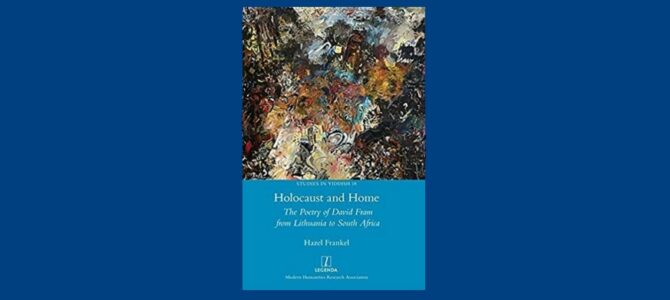Cover: Hazel Frankel, “Holocaust and Home: The Poetry of David Fram from Lithuania to South Africa.” Legenda, 2021. 230 pp.
My mother started learning Yiddish late in life. I felt as if she was reaching out to her dead parents, trying to connect with them. Both her mother and her father were immigrants to South Africa from Lithuania, one from the town of Shadova, the other from Pokroy. My grandfather, Abe, who came from a long line of yeshiva bochers, attended the famed Telz yeshiva. Intellectually curious, he read War and Peace in the original Russian. Later, at the Claremont shul in Cape Town, he gave many of the Saturday afternoon shiurim, written in Yiddish but delivered in English.
His wife, Anne, for who I am named, was nine years his junior. They owned a dress shop in Cape Town and, before the war, Abe went on business trips to Europe to buy the latest fashions, often with specific customers’ needs in mind. Both Abe and Anne died in their fifties, several years before I was born. I know them only from photographs. Their sepia-toned wedding photo hung in our breakfast room, where we ate all our meals. Abe was short, wore glasses, and gazed solemnly at the camera. Anne seemed softer, gentler, and had a twenties-style headdress that looked like a shower cap. There were odd flecks of white on the image that I always imagined was confetti but must have been blemishes on the photographic paper or the camera lens.
Although they were gone, they were always with us. Reading Hazel Frankel’s “Holocaust and Home: The Poetry of David Fram from Lithuania to South Africa,” I felt as if my ancestors were reaching out to tell me about the places they’d left, what they saw and felt in their new country, and the horror that befell the relatives who stayed behind in their native land. Frankel’s insightful and sensitive study of Fram’s life and his work is not only an important work of scholarship, shedding light on one of the furthest corners of the Yiddish-speaking world; it also feels quite personal to me, both as the granddaughter of immigrants from Lithuania to South Africa and as an immigrant myself. In “Ikh Benk,” Fram writes: “I wearily long for a piece of black, swollen earth,/For autumn rains on the fields and mud on endless roads…” (114). As Frankel points out, “Despite the welcoming and intoxicating climate, the immigrant cannot come to terms with the extreme differences between the soft, flat landscape, pale skies, and gleaming snow of his homeland, and the hot plains of Africa.” I’ve done the reverse journey, leaving the Southern Hemisphere for the North, leaving warmth for cold, but have felt the same loneliness buried deep, the same longing for the country of my birth. In my case, the longing is for the sun-drenched vistas of my childhood, those “sunny distances of everlasting summer” that make Fram “feel the loneliness doubly.”
Full review here.


